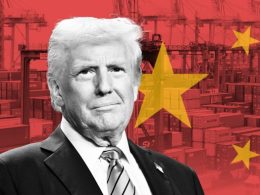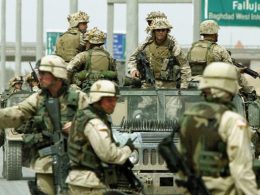The Argentine peso strengthened more in real terms than any other currency in 2024, boosting the popularity of libertarian President Javier Milei even as economists question the sustainability of high prices in Argentina.
The peso strengthened 44.2 per cent in the first 11 months of the year against a basket of trading partners’ currencies, adjusting for Argentina’s triple digit annual inflation, according to data from the Bank for International Settlements analysed by Argentine consultancy GMA Capital. That far outpaces the 21.2 per cent gain for the Turkish lira in second place.
The gains for the government-set exchange rate have been replicated on several legal and illegal parallel markets where Argentines buy dollars because access to the official rate is restricted.
The trend is popular with Argentines, who have seen average salaries almost double in dollar terms to $990 from December 2023 to this October at the parallel rate, after seven years of near-constant depreciation.
But it has come at a cost. Argentina’s central bank has struggled to rebuild its virtually empty hard currency reserves as it spends dollars to keep the peso strong.
Now, some analysts warn the rapid depreciation of the real in neighbouring Brazil and a potential tariff spree by incoming US president Donald Trump could leave Argentina vulnerable to a sudden devaluation.
“Milei’s programme is working, but the peso’s appreciation is the greatest risk going forward,” said Ramiro Blázquez, head of research at investment bank BancTrust. “If the peso continues to appreciate, or if there is a big external shock, demand for cheap dollars could surge, increasing the risk of devaluation.”
The stronger currency — dubbed the “super peso” in local media — is making itself felt in Argentina as prices in dollars soar. A Big Mac hamburger costs $7.90 compared with $3.80 a year ago, at the official exchange rate. Earlier this month, steelmaker Ternium warned that labour costs in Argentina had become “60 per cent more expensive” than in Brazil.
Business leaders fret privately that the dynamic could soon begin to hurt the competitiveness of Argentine exports.
The stronger peso is a side effect of Milei’s effort to stabilise an economy that was on the brink of hyperinflation when he took office a year ago.
Alongside a severe austerity programme, he maintained the strict currency controls he inherited. After an initial big devaluation last December he kept the peso mostly stable throughout 2024. Overall, the value of the currency fell by just 18 per cent in the first 11 months, even though inflation for the same period was 112 per cent.

Milei, a former private sector economist, has said a fresh devaluation would derail his successful macroeconomic stabilisation.
He has argued that Argentina can become competitive by deregulating, lowering taxes and improving access to credit. Meanwhile, the government expects its foreign currency shortage will ease in the coming years as large-scale investment in the country’s massive lithium, shale oil and gas reserves results in increased exports.
“Argentina has always looked to a weaker exchange rate to solve our competitiveness problems, and it has generated many crises in our history,” said Nery Persichini, head of research at GMA Capital. “Now times are changing.”
Pressure for an official devaluation has eased in the short term with the peso’s strengthening on the black market and parallel markets over the past six months.
The closely watched gap between the official and unofficial rates has shrunk to less than 20 per cent, compared with around 200 per cent in early December 2023, thanks to growing confidence in Milei, as well as government policies including a scheme that allows exporters to convert part of their dollar earnings to pesos in the parallel market, rather than with the central bank.
It has boosted Milei’s popularity. “Public opinion is extremely sensitive to the dollar,” said Lucas Romero, director of pollster and consultancy Synopsis. “A cheap dollar allows the middle class to holiday abroad, and creates a sense of stability.” Previous governments have deliberately engineered a strong peso in electoral periods, he added.
Despite the less competitive exchange rate, crop sales by Argentina’s crucial agricultural exporters have mostly been “in line with the average of the previous five years”, said Ezequiel de Freijo, chief economist at agribusiness association Sociedad Rural Argentina.
But Milei’s bid to avoid a devaluation will face threats in 2025 — including from Trump, whom the libertarian considers a key ally.
“If the incoming US administration puts large tariffs on China, this will unleash a wave of devaluations across emerging markets,” Robin Brooks, a senior fellow at think-tank the Brookings Institution said on X in December. “The peso is way overvalued anyway and needs to fall.”
The exchange rate in Argentina over the past 54 years has averaged 1,510 pesos to the dollar, in inflation-adjusted terms, compared with about 1,050 pesos to the dollar today, according to analysis by Martín Rapetti, director of Equilibra, an economic think-tank in Buenos Aires.
Rapetti said that the government would “most likely” be able to sustain its current foreign exchange policy in 2025, after a recent tax amnesty led to an influx of dollars into the economy, but that it was “highly improbable” that Argentina could support such an expensive peso beyond next year.
The country has never previously sustained a trade surplus — which it needs to replenish its hard currency reserves — with the peso at such strong levels, and Rapetti said the mining and energy boom would not be enough to tip the balance.
The real test for the peso will come when Milei lifts currency controls and floats the peso which he has pledged to do by the end of 2025.
Nicolás Dujovne, a former Argentine economy minister, said he believed a floating peso could stay near this strength thanks to growing confidence in the country and demand for its exports — but only if Milei could keep up the austerity drive that underpinned current market enthusiasm.
“With the stronger exchange rate, the fiscal reforms become more and more important, and [losing confidence] would be a bigger problem,” he added. “Every day the game we’re playing is more demanding.”
Source link









